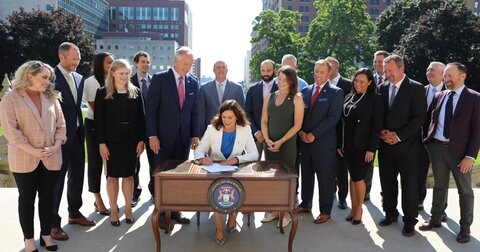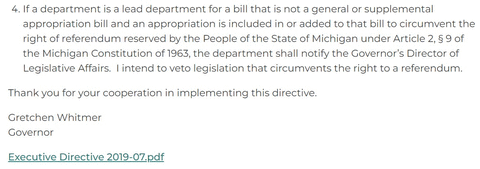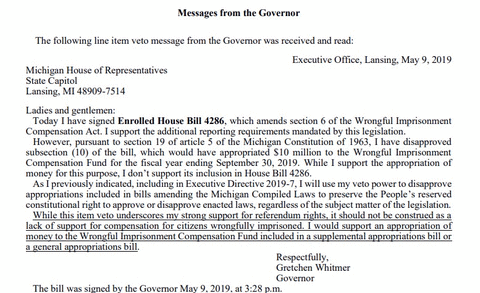Whitmer would violate her own directive by signing right-to-work repeal
An appropriation attached to the bill gives it immunity to a voter referendum, something Whitmer once opposed
Gov. Gretchen Whitmer could easily remove the legislative trick she says she objects to in the legislature’s right-to-work repeal bills.
The governor is expected to sign a repeal of the state’s decade-old right-to-work law despite her stated misgivings about a provision that would make the legislation immune from referenda. But the state’s consitution gives the governor the authority to remove this provision.
The versions of the bill that passed both chambers of the state house contain spending appropriations. Under Michigan law, a policy bill that contains an appropriation may not be subject to a popular referendum.
Whitmer publicly opposes the practice of referendum-proofing legislation in this way, and she issued an executive directive prohibiting the practice in 2019.
“I intend to veto legislation that circumvents the right to a referendum,” Whitmer wrote in Executive Directive 2019-07.
The right-to-work repeal bill carries a $1 million appropriation that makes it immune to repeal. The governor addressed this issue in comments to reporters last week.
"I have fought against the creation of this barrier in the first place. I did not ask the Legislature to put that part into the bill and it certainly is not on my agenda,” Whitmer said at a March 13 press conference. "But I am going to sign a bill that restores workers’ rights."
Article 5, section 19 of the Michigan Constitution provides a clear solution to the governor’s dilemma, in the form of a line-item veto:
The governor may disapprove any distinct item or items appropriating moneys in any appropriation bill. The part or parts approved shall become law, and the item or items disapproved shall be void unless re-passed according to the method prescribed for the passage of other bills over the executive veto.
Whitmer used the line-item veto in 2019 to remove an appropriation in House Bill 4286. That bill passed both chambers unanimously. But it also included a $10 million appropriation, which made it immune to a referendum.
“It had the appearance of a policy bill because it revised some details of the process for dealing with giving compensation for wrongful imprisonment,” wrote Jack McHugh, then the senior legislative analyst and editor of MichiganVotes.org at Mackinac Center for Public Policy.
Voter referenda allow the public to decide whether a bill should become law.
 Whitmer wrote in Michigan House Journal 46 of 2019 that her line-item veto “underscores my strong support for referendum rights,” but she said she would support the appropriation if it came in another form.
Whitmer wrote in Michigan House Journal 46 of 2019 that her line-item veto “underscores my strong support for referendum rights,” but she said she would support the appropriation if it came in another form.
“The Michigan Constitution is clear: Gov. Whitmer has the authority to line-item veto the appropriations portions of these bills and respect voters' referendum rights,” said Steve Delie, director of labor policy at the Mackinac Center. “The governor should give the people of Michigan a voice on this important issue and leave the decision on right-to-work to the voters.”
The governor’s office did not immediately respond to a request for comment.
Michigan Capitol Confidential is the news source produced by the Mackinac Center for Public Policy. Michigan Capitol Confidential reports with a free-market news perspective.




